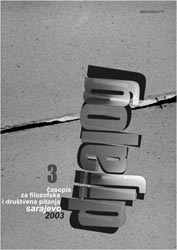S DRUGIM
WITH THE OTHER
Author(s): Rusmir MahmutćehajićSubject(s): Philosophy
Published by: Akademija Nauka i Umjetnosti Bosne i Hercegovine
Summary/Abstract: The paper “With the Other” is the basis for a lecture given by the author in Vienna on 18-20 October 2002 at the invitation of the European Academic of Science and the Arts. The paper covers various views of alterity in traditional and modern, secular understandings. As the author indicates, languages, meanings and symbols, as the central elements of culture, do not have the same standing in these two outlooks. In the traditional teachings, they are wholly and always translatable in the light of the transcendental absolute or utter alterity. None of their manifestations is the same as their transcendent archetype. As a result, alterity is evidence of the transcendental absolute: to be in a relationship with the other and different means to bear witness that utter alterity, or human openness to perfection, is always present in that relation. This standpoint is the essence of every sacred tradition. The exclusion of that higher reality that is unknowable and indefinable, but without which there is neither knowledge nor definition, compels human beings to isolate themselves within the world, themselves and their understandings. Modern outlooks that can be described as non-traditional in the intellectual sense postulate human freedom and sufficiency in an onto-topological orientation as the measure of influence on the social order and the advancement of the self, society and the world through that mutuality. Heteronymous or transcendent authority in the direction of the self is here excluded. The way these differing understandings are reflected in contemporary political, cultural and economic disruptions and tensions is the subject of discussion in the sections of the paper reproduced here. In particular, the relations between individual and group identities are considered, and the reflection of these various views on understandings of confidence and tolerance. The fundamental traditional doctrine of humankind’s ontological poverty and debt to the Absolute is set out; a doctrine that has many resonances in contemporary philosophical views of human rights and human dignity. Emphasizing and defining differences of understanding, in the author’s view, enables one to deconstruct the lack of discrimination between these two utterly differently based outlooks. Differentiating between them would make it possible to establish and conduct a discussion in which the recollection and awareness of the need and potential for translating everything that the speakers utter in those two languages would become more powerful. And this, the author believes, would promote the cruciality and inviolability of difference in every relationship of human beings with themselves, others and the world.
Journal: Dijalog - Časopis za filozofiju i društvenu teoriju
- Issue Year: 2003
- Issue No: 03
- Page Range: 25-37
- Page Count: 13
- Language: Bosnian

